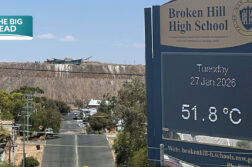Australia’s new free trade agreement (FTA) with South Korea, promoted as a win for Australian exports, includes a clause that could spell big trouble for Australia's environmental movement and sovereignty.
The FTA, agreed upon by both nations but yet to be ratified by parliament, includes an Investor-State Dispute Settlement (ISDS) provisions that allows overseas investors to challenge threats to their business interests in international courts.
For the environment movement fighting to protect land and water in NSW, this has enormous implications.
There are currently three South Korean mining companies in NSW with significant interests in huge and environmentally controversial coal projects. In the Bylong Valley the South Korean government-owned KEPCO has 100 per cent ownership of the Bylong Coal mine and plans to extract 420 million tonnes of thermal coal from the area.
Another South Korean government-owned enterprise KORES has recently received NSW government support to develop the $800 million Wallarah-2 coal project in the Central Coast water catchment area, a project previously turned down by the former NSW Labor government.
And then there is POSCO, the 100 per cent owner of what used to be Hume Coal in the Southern Highlands, who are facing significant local community action against its social licence including a seven-month blockade. At stake for POSCO is 446 million tonnes of coking coal.
What is particularly concerning about the new trade deal and its inclusion of an ISDS is the international precedent set in regards to these clauses.
Trade Minister Andrew Robb was quick to assure Australians that sufficient safeguards were in place. But such "safeguards" didn’t stop the Canadian-based Pacific Rim Mining Corporation suing the El Salvador government when it refused a mining license for environmental reasons. The same safeguards didn’t stop Renco, a US company, suing the Peru government after it was told to clean up its lead pollution.
Similar ISDS provisions in the North American Free Trade Agreement were also used by US energy company Lone Pine to sue the Quebec provincial government for $250 million after it suspended shale gas mining pending a study into its environmental impact.
The Australia Fairtrade and Investment Network (AFTINET) says Australia should be very concerned about ISDS provisions in the South Korea agreement and also the proposed Trans-Pacific Partnership agreement, which Prime Minister Tony Abbott is currently negotiating. Last year more than 70 groups signed Lock the Gate’s open letter to Minister Andrew Robb stating that “the inclusion of ISDS in more trade agreements … could cost taxpayers many millions of dollars, and would discourage governments from regulating in the public interest”.
Adding to the controversy surrounding the South Korean backed mines is the fact former Resources Minster Chris Hartcher is currently under ICAC investigation for (among other things) his relationship with Nick Di Girolamo, a former lobbyist for the South Korean conglomerate Kores.
It has recently been revealed that Hartcher dined with representatives of Kores at Di Girolamo’s house while Kores was trying to get the Wallarah-2 coal mine approved. At the end of 2012 when he was still Resources Minister, Hartcher also made an 8-day visit to South Korea and China to “assist in meeting the key results of the 2012-2015 Strategic Plan for NSW Trade & Investment.” He met with KEPCO, KORES and POSCO, including a site visit to KEPCO, his only scheduled event for that particular day.
Over the past three years environmental campaigners in NSW have achieved some significant wins against coal seam gas mining companies including in the Northern Rivers, at Fullerton Cove and in the Illawarra and Sydney.
The O’Farrell government has also introduced some legislation, such as the No Go Zones for Coal Seam Gas (CSG) mining in Sydney, and a moratorium on CSG in Sydney Drinking Water Catchments. The EPA has also fined, albeit extremely modestly, a number of mining companies for pollution breaches.
These hard fought wins are all in jeopardy if the foreign-owned companies can sue for loss of financial return.
As the fight to protect NSW continues, environmental campaigners have started to embrace the rhetoric of war, with references to “defending land and water from the invasion of mining”, “fighting to protect land and water” and an “attack on human rights”. Trade agreements like the South Korea FTA and the proposed TPP may be signed in peace time, but they sign away what wars are fought over: rights to land and water, business interests and culture.
Appeals in letters such as this one to the South Korean ambassador from the Southern Highlands Action Group against Coal are effectively rendered worthless, and it is the same for appeals to local MPs and other legitimate channels for community support within our democracy.
In the war over environmental protection and the right to protect Australia's land and water, Tony Abbott may have handed a powerful piece of ammunition to foreign corporations. If he signs the TPP in may — which includes major trading partners Japan and the US — it will be full surrender.
Donate To New Matilda
New Matilda is a small, independent media outlet. We survive through reader contributions, and never losing a lawsuit. If you got something from this article, giving something back helps us to continue speaking truth to power. Every little bit counts.



